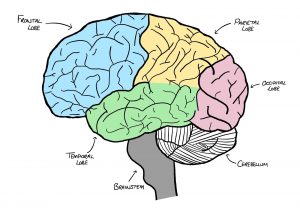Do humans have the biggest brain?
Meera Mahesh
Scientists estimate there are 15 million species on our planet. But only 2 million of them have been identified so far. What do you think makes one species more intelligent than another? Why have humans managed to build civilisations and empires while lions and bears haven’t? The simple answer is…it’s complicated.
 Your brain is what’s enabling you to read this right now. It could be argued that it’s the most important organ – it’s in control of nearly everything your body does! All vertebrates (animals with a backbone for example mammals, birds, reptiles, amphibians and fish), and most invertebrates (animals without a backbone for example, insects, spiders, squids, earthworms) have a brain.
Your brain is what’s enabling you to read this right now. It could be argued that it’s the most important organ – it’s in control of nearly everything your body does! All vertebrates (animals with a backbone for example mammals, birds, reptiles, amphibians and fish), and most invertebrates (animals without a backbone for example, insects, spiders, squids, earthworms) have a brain.
Your (human) brain has loads of different parts. Some scientists say the most important part of your brain when it comes to intelligence is the frontal lobe. The frontal lobe is responsible for movement, language, planning, organising, and self-control. This would explain partially why humans are the most intelligent species: humans have the largest frontal lobes in all species.
 Having said this, a sea lion also has a large frontal lobe. So clearly intelligence is not just about frontal lobe size.
Having said this, a sea lion also has a large frontal lobe. So clearly intelligence is not just about frontal lobe size.
Well, maybe humans just have the biggest, and therefore heaviest brains of all species. The average human adult brain is about 1.5 kg. Sounds pretty heavy, right? Well, compare that to that of a sperm whale, which weighs in at an average of a whopping 8 kg. Even a bottlenose dolphin has a higher average brain mass than humans at 1.6 kg.
So, we’ve learnt that humans don’t have the largest brains by mass, but they do have a big frontal lobe, an important part of the brain to do with personality.
Some scientists have suggested that intelligence isn’t to do with the actual size of the brain, but rather the size of the brain in relation to the body of the individual. The bigger the size of the brain in relation to the body, the more intelligent.
For example, say an average human weighed 70 kg and the average brain mass was 1.5 kg. This means the human’s brain:body ratio is 1:47. Let’s have a look at the brain:body ratios of a few other animals to compare:
| Animal | Brain:Body Ratio |
| Human | 1:47 |
| Chimpanzee | 1:113 |
| Elephant | 1:560 |
From those ratios, you can see the brain takes up more weight in humans than in other species. But this still doesn’t explain everything: we have a very similar brain:body ratio as mice.
 Further research involving looking at brain tissue through microscopes has shown scientists that intelligence doesn’t depend as much as on the size of the brain as they thought before. It is more to do with how well the different parts of your brain communicate with each other. The brain is made up of cells called neurons which have gaps between them called synapses. There are lots of things you can do to strengthen how well your neurons connect to each other: make sure you sleep enough and exercise, do plenty of puzzles and read as much as you can.
Further research involving looking at brain tissue through microscopes has shown scientists that intelligence doesn’t depend as much as on the size of the brain as they thought before. It is more to do with how well the different parts of your brain communicate with each other. The brain is made up of cells called neurons which have gaps between them called synapses. There are lots of things you can do to strengthen how well your neurons connect to each other: make sure you sleep enough and exercise, do plenty of puzzles and read as much as you can.
Humans don’t have the heaviest or biggest brains, but they do have a lot of neurons, and their brains take up a bigger part of their total weight than many other species. All of these combined means humans are more intelligent than a lot of species and have managed to make some great creations.
